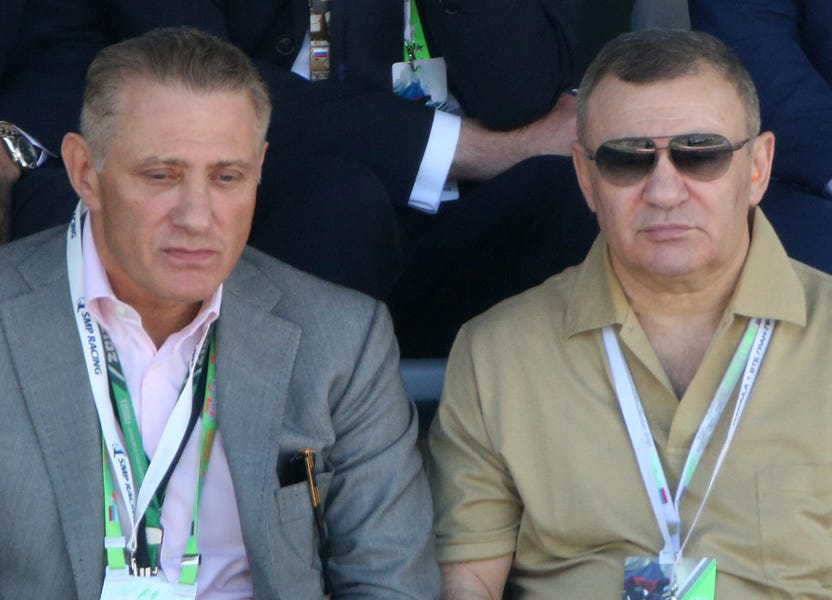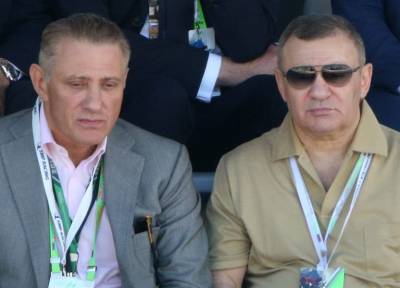In a country where kids’ lemonade stands get shut down by overzealous health inspectors, it’s difficult to imagine a multibillion dollar industry operating under near-zero regulations. But somehow, the U.S. art market, which accounts for 44 percent of global art sales—around $28.3 billion in 2019—is cloaked in mutual secrecy between purchasers and sellers. This opaqueness attracts opportunists who use the arts and antiques trade to launder money, and—as recently confirmed through a bipartisan Senate investigation—to evade U.S. sanctions.
A congressional report released Wednesday details how sanctioned Russian oligarchs with close personal and financial ties to President Vladimir Putin dealt in high-value art to gain access to the U.S. economy. Arkady and Boris Rotenberg maneuvered the art world post-sanction—racking up $18.4 million in art transactions—to take advantage of the largest legal, unregulated industry in the country.
The art and antiques trade has long earned the reputation as a place for the wealthy to turn ill-gotten gains into legitimate investments. The industry deals in high-dollar items, anonymity, and large cash purchases—allowing individuals like the Rotenbergs to covertly buy up expensive work and lock it away until it serves a useful purpose. Not to mention, art is an illiquid asset and acts as a mostly tax-free way to stash large sums of money for longer periods of time.
To uncover how Russian oligarchs were apparently eluding sanctions, investigators compiled more than 1 million documents, interviews with 20 individuals, and information requests from seven financial institutions and four major auction houses. Their findings? “The art industry currently operates under a veil of secrecy allowing art advisors to represent both sellers and buyers masking the identities of both parties, and as we found, the source of the funds. This creates an environment ripe for laundering money and evading sanctions,” Sen. Rob Portman said in a statement.
President Obama sanctioned the Rotenbergs in a 2014 executive order aimed at punishing Putin’s inner circle for Russia’s annexation of the Crimean peninsula. Arkady Rosenberg is a longtime confidant (and childhood judo sparring partner) of the Russian president, which seems to come with its perks. Putin contracted a Rotenberg-owned construction company to build the 12-mile bridge connecting Crimea to mainland Russia for $3.7 billion. The business partnership hardened Russia’s illicit control over the peninsula, drawing condemnation from the United States and Europe.
Because the regulations of the Bank Secrecy Act (BSA) do not extend to art transactions, auction houses often establish their own anti-laundering protocols and sanction compliance programs. As the Rotenbergs proved, however, clients can easily circumvent these rules using a broker. Most high-value art sales go through intermediaries called art advisers who typically represent both buyers and sellers. The art industry operates through an opaque policy of “don’t ask, don’t tell” when it comes to the clients behind the middlemen.
To further complicate matters, the report found that half of all art transactions in the United States occur through private dealers, who more often than not have no disclosure practices. One private dealer told the congressional investigation that she looks for “red flags” and makes decisions using “her gut.” The $7.5 million sale of René Magritte’s La Poitrine was conducted through one such dealer before being traced to a Rotenberg-linked shell company.
Auction houses and private dealers work tirelessly to do their due diligence, but only as it pertains to the provenance of artwork, not the identity of clients. For Arkany and Boris Rotenberg, U.S. citizen Gregory Baltser served as an intermediary and an inroad into New York auction houses. The owner of Baltzer Auction Agency in Moscow introduced himself as the principal buyer to the auction houses involved in the Rotenbergs’ transactions, easily bypassing anti-laundering policies.
Beginning two months after the Rotenbergs were personally sanctioned in March 2014, Baltser helped them purchase art totaling more than $18 million into November 2014. The report also followed the transfer of at least $91 million between shell companies owned by the Rotenbergs and the United States economy, despite sanctions.
“The need to identify the ultimate client—in particular the ultimate ownership of offshore entities—is absolutely central to our current AML policy,” a spokesman for Phillips, one of four auction houses investigated by the subcommittee, told The Dispatch. “We are confident that, just as banks have done, the art industry will find a balance between the legitimate need for discretion and confidentiality and the level of transparency necessary to ensure that the art market cannot be used for illicit purposes.”
In all, the Rotenbergs accumulated millions of dollars worth of iconic artwork despite sanctions. On behalf of the brothers, Baltser purchased pieces by Henry Moore, Marc Chagall, Georges Braque, and Lyonel Feininger. The Senate investigators who briefed reporters made it clear that these purchases were part of the Rotenberg investment portfolio, not the personal collection of art aficionados. Many of the pieces themselves were stored outside of Russia, far away from the brothers’ St. Petersburg residences.
The United States makes up the largest portion of the art industry worldwide, yet its market lacks many of the basic regulatory policies enforced in other countries. In 2018, the European Union broadened its anti-money laundering legislation to include art transactions of 10,000 euros or more. The report recommends a similar course of action for the United States, proposing the extension of the Bank Secrecy Act to high-value art deals to establish the identity of both buyer and seller.
While $18 million seems like a far cry from a national security threat, it may just be a drop in the bucket. Senate investigators emphasized that this instance demonstrates to bad actors around the world that United States sanctions are easy to evade, thereby damaging their efficacy.
“Criminals, terrorists and wealthy Russian oligarchs like the Rotenbergs are able to use an unregulated art industry, as well as real estate and other investments, to hide assets, launder funds, and evade sanctions,” Delaware Sen. Tom Carper said in a statement. “Unfortunately, our failure to close these obvious loopholes make U.S. sanctions— an important national security tool—far less effective than they could be.”







Please note that we at The Dispatch hold ourselves, our work, and our commenters to a higher standard than other places on the internet. We welcome comments that foster genuine debate or discussion—including comments critical of us or our work—but responses that include ad hominem attacks on fellow Dispatch members or are intended to stoke fear and anger may be moderated.
With your membership, you only have the ability to comment on The Morning Dispatch articles. Consider upgrading to join the conversation everywhere.